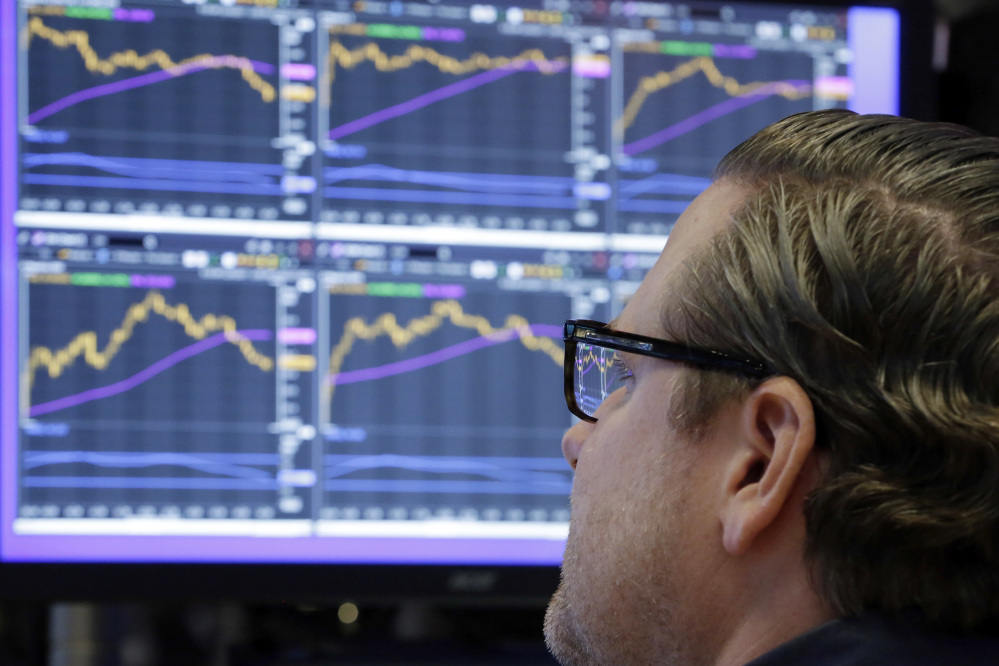NEW YORK — Stock indexes didn’t do much at first glance Monday, but the modest move for the Standard & Poor’s 500 masked some dramatic changes roiling underneath the surface.
Telecom stocks, banks and other areas of the market that stand to benefit the most from Washington’s drive to cut corporate tax rates jumped. At the same time, technology stocks slumped and gave up a chunk of the gains that have made them the best-performing part of the market by far this year.
The New York Stock Exchange was nearly evenly split between stocks that rose and fell, and the split in performance left the S&P 500 close to where it began the day. It dipped 2.78 points, or 0.1 percent, to 2,639.44.
The Dow Jones industrial average rose 58.46, or 0.2 percent, to 24,290.05, and the Nasdaq composite fell 72.22, or 1.1 percent, to 6,775.37.
The cross-currents swept through the market on the first day of trading after the Senate narrowly approved its proposal to revamp the tax system. Indexes initially jumped on expectations that lower tax rates would help corporate profits pile up even higher, and the S&P 500 was up as much as 0.9 percent in morning trading.
Lower tax rates would help boost profits for companies, which already have been reporting resurgent earnings growth this year thanks to the improving global economy. If profits do accelerate, it would help allay worries that the stock market, which is still close to record highs, has climbed too far, too quickly.
Telecommunications companies pay some of the highest effective tax rates among the big companies in the S&P 500, so they stand to reap some of the biggest rewards of lower tax rates. Telecom stocks in the index jumped 1.6 percent, tied for the biggest gain of the 11 sectors in the index.
Financial stocks, which analysts also expect to be winners from the tax overhaul, likewise climbed 1.6 percent.
Technology companies, meanwhile, will likely get less of a boost. They already were typically paying the lowest effective tax rates of the 11 sectors in the S&P 500, analysts said.
Tech stocks in the index dropped 1.9 percent, lagging far behind the rest of the market. It’s a very different position for the sector, which has nearly doubled the performance of the S&P 500 this year. The strong gains earlier in the year led some skeptics to say that tech stocks had become overly pricey.
“It’s not that the tax bill is negative for tech companies,” said Ernie Cecilia, chief investment officer at Bryn Mawr Trust. “It’s just less positive for it than for other areas. The message is that although tax reform seems to be a positive, we have to see how that will play out on individual companies and industries.”
Adding to the uncertainty is the work that remains for the tax overhaul to become law. The Senate and House of Representatives still need to iron out differences in their respective proposals, and Cecilia warned that stocks could see more ups and downs as details come out in coming days about which companies will most benefit.
Congress still has a packed schedule, the tax-overhaul notwithstanding. Washington faces a deadline on Friday to avert a shutdown of the government.In the bond market, the yield on the 10-year Treasury note held steady at 2.37 percent.
The dollar rose to 112.60 Japanese yen from 112.05 yen late Friday. The euro fell to $1.1855 from $1.1893, and the British pound rose to $1.3471 from $1.3468.
Benchmark U.S. crude slumped 89 cents to settle at $57.47 per barrel. Brent crude, the international standard, fell $1.28 to $62.45 a barrel in London.
Send questions/comments to the editors.



Success. Please wait for the page to reload. If the page does not reload within 5 seconds, please refresh the page.
Enter your email and password to access comments.
Hi, to comment on stories you must . This profile is in addition to your subscription and website login.
Already have a commenting profile? .
Invalid username/password.
Please check your email to confirm and complete your registration.
Only subscribers are eligible to post comments. Please subscribe or login first for digital access. Here’s why.
Use the form below to reset your password. When you've submitted your account email, we will send an email with a reset code.